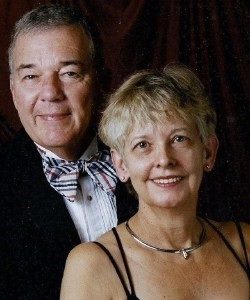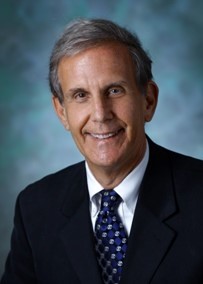 PAUL CINQUEGRANA loved Italy. So did his neurologist, David Zee. At his first appointment with Zee, in 2001, Cinquegrana learned that he had multiple system atrophy (MSA), a rare neurological condition that shares many symptoms with Parkinson’s Disease. During their meetings in the years that followed, the pair would of course talk about Cinquegrana’s condition and Zee’s research in that field; yet, their conversations inevitably gravitated to the happy topic of Italy.
PAUL CINQUEGRANA loved Italy. So did his neurologist, David Zee. At his first appointment with Zee, in 2001, Cinquegrana learned that he had multiple system atrophy (MSA), a rare neurological condition that shares many symptoms with Parkinson’s Disease. During their meetings in the years that followed, the pair would of course talk about Cinquegrana’s condition and Zee’s research in that field; yet, their conversations inevitably gravitated to the happy topic of Italy.
Paul Cinquegrana died in 2007. In memory of her husband of 38 years, and in recognition of his close rapport with Zee, his widow, BETTY CINQUEGRANA, made an initial donation to Johns Hopkins to support the work of a research fellow in Zee’s lab. That gift was the first of many over more than a decade of friendship that culminated in an estate gift from Betty that provided the majority of the funds to establish the David Zee, M.D. and Paul and Betty Cinquegrana Professorship.
When making the gifts, Betty recalled the relationship between Paul and David Zee: “It was amazing. Dr. Zee could give him such bad news, and Paul still wanted to go see him.” The gifts, she said, “were in appreciation for Dr. Zee’s being such a wonderful diagnostician and a wonderful doctor, plus the hope that it would help others with this disease.” Her husband, she said, had visited at least seven doctors in search of an explanation for his symptoms before a neurologist in the community referred him to Zee, who was able to make the correct diagnosis.
The Cinquegranas were philanthropists in every sense of the word. They not only supported Johns Hopkins Medicine, but also the University of Maryland Robert H. Smith School of Business, Dematha High School, and other local charities.
Held by David S. Zee
 DAVID S. ZEE, MD, came to Johns Hopkins as a medical student in 1965 and has been a member of the Johns Hopkins Faculty since 1975. With more than 50 years of experience, Dr. Zee has received both national and international recognition—from his colleagues, as well as his patients. He has been fortunate to be involved in the care of four generations of patients in two families. His accomplishments span being an outstanding clinician, an imaginative and productive scientist (with more than 450 publications, the coauthor of five editions of the text book, “The Neurology of Eye Movements”, and decades of continuous funding from the National Institutes of Health) and an innovative teacher of students—undergraduate, pre-doctoral, post-doctoral, medical residents, fellows and physicians.
DAVID S. ZEE, MD, came to Johns Hopkins as a medical student in 1965 and has been a member of the Johns Hopkins Faculty since 1975. With more than 50 years of experience, Dr. Zee has received both national and international recognition—from his colleagues, as well as his patients. He has been fortunate to be involved in the care of four generations of patients in two families. His accomplishments span being an outstanding clinician, an imaginative and productive scientist (with more than 450 publications, the coauthor of five editions of the text book, “The Neurology of Eye Movements”, and decades of continuous funding from the National Institutes of Health) and an innovative teacher of students—undergraduate, pre-doctoral, post-doctoral, medical residents, fellows and physicians.
As a Professor of Neurology at Johns Hopkins, he holds joint appointments in Ophthalmology, Otolaryngology—Head and Neck Surgery, and Neuroscience; his scholarship and teaching have influenced each of these areas of medicine. Dr. Zee specializes in vertigo and dizziness, imbalance and ataxia, and eye movement disorder and nystagmus. He combines clinical practice and teaching with both basic and clinical research. A major research interest of Dr. Zee is in how we adapt to diseases that produce incapacitating vertigo and imbalance; he wants to uncover the mysteries of how the brain compensates for disease, and how recovery can be enhanced. His research strategy is to combine the disciplines of biomedical engineering, physiology and neurological practice to understand how the brain functions, and to use that information to diagnose and rehabilitate neurological patients more effectively. Dr. Zee and his group’s latest discoveries regarding how magnetic fields affect the brain have opened an exciting, completely new area of research into understanding how the inner ear functions and to developing new diagnostic techniques and therapies for many types of diseases that produce vertigo, imbalance and impaired vision. This work has been recently recognized by the Dean of Johns Hopkins Medicine as “groundbreaking” and for it, Dr. Zee received a prestigious Discovery Award. In addition,he will soon receive the Barany Gold Medal from the medical faculty at the University of Uppsala in Sweden for “the author who in the last five years has published the most valuable work on the vestibular apparatus in the widest sense of this term”.
True to the tripartite mission of Johns Hopkins, in addition to research, Dr. Zee is dedicated to education and patient care. He focuses significant resources and time on training physicians and scientists in ocular motor and vestibular disorders, both in the U.S. and abroad. For these efforts, in the past year he received a “Champion of Vestibular Medicine” from the Vestibular Disorders Association and the Johns Hopkins Medical Institution’s “Abeloff Award” for lifetime achievement in medical and biomedical education. He has given many named lectures including four inaugural named lectures. In his career at Johns Hopkins, Dr. Zee has seen his neurotology division become the largest such division in a Department of Neurology in the country and it has trained a vast number of physician-scientists both in our country and abroad. A true testament to his great leadership is seen in the impact he has had on his trainees. Among his trainees are vestibular neurologists at Johns Hopkins, Harvard, Emory, Northwestern, and Case Western Reserve. Internationally, the leading vestibular neurologists in Swiss, French, and Italian neurotology are among his trainees. Neuro-ophthalmologists in Canada, China, Japan, Germany and Sweden have, too, trained with Dr. Zee at Johns Hopkins. Of his many international collaborations, the longest standing has been with colleagues at the University of Siena, spending a month there each summer, both to investigate the causes of vertigo, and to soak up Italian culture and friendship. In addition to training the next generation of doctors, Dr. Zee values his time with patients and their families, and says he learns something new about neurological disease from every patient. Many patients note his kind, compassionate demeanor, value his ability to listen intently, and appreciate his guiding principle that on every visit a physician can always do something to make a patient feel better, even if one cannot cure their disease.
 PAUL CINQUEGRANA loved Italy. So did his neurologist, David Zee. At his first appointment with Zee, in 2001, Cinquegrana learned that he had multiple system atrophy (MSA), a rare neurological condition that shares many symptoms with Parkinson’s Disease. During their meetings in the years that followed, the pair would of course talk about Cinquegrana’s condition and Zee’s research in that field; yet, their conversations inevitably gravitated to the happy topic of Italy.
PAUL CINQUEGRANA loved Italy. So did his neurologist, David Zee. At his first appointment with Zee, in 2001, Cinquegrana learned that he had multiple system atrophy (MSA), a rare neurological condition that shares many symptoms with Parkinson’s Disease. During their meetings in the years that followed, the pair would of course talk about Cinquegrana’s condition and Zee’s research in that field; yet, their conversations inevitably gravitated to the happy topic of Italy. DAVID S. ZEE, MD, came to Johns Hopkins as a medical student in 1965 and has been a member of the Johns Hopkins Faculty since 1975. With more than 50 years of experience, Dr. Zee has received both national and international recognition—from his colleagues, as well as his patients. He has been fortunate to be involved in the care of four generations of patients in two families. His accomplishments span being an outstanding clinician, an imaginative and productive scientist (with more than 450 publications, the coauthor of five editions of the text book, “The Neurology of Eye Movements”, and decades of continuous funding from the National Institutes of Health) and an innovative teacher of students—undergraduate, pre-doctoral, post-doctoral, medical residents, fellows and physicians.
DAVID S. ZEE, MD, came to Johns Hopkins as a medical student in 1965 and has been a member of the Johns Hopkins Faculty since 1975. With more than 50 years of experience, Dr. Zee has received both national and international recognition—from his colleagues, as well as his patients. He has been fortunate to be involved in the care of four generations of patients in two families. His accomplishments span being an outstanding clinician, an imaginative and productive scientist (with more than 450 publications, the coauthor of five editions of the text book, “The Neurology of Eye Movements”, and decades of continuous funding from the National Institutes of Health) and an innovative teacher of students—undergraduate, pre-doctoral, post-doctoral, medical residents, fellows and physicians.